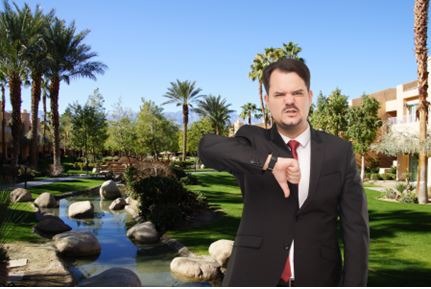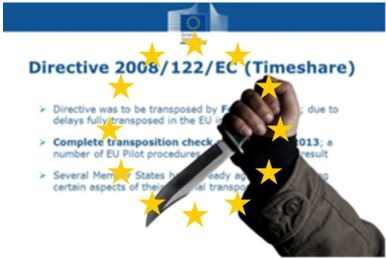Ever since the EU timeshare Directive of 2008 was adopted by member states into their own statute law, countries at the forefront of timeshare, such as Spain have had to tow the line. The 14 days we refer to is basically a cooling off period, in other words, a period that allows would be buyers to pause and reflect as to what they are about to enter into is really for them.
This in itself is no bad thing but had a massive effect on the timeshare industry. The fact that a 14 day cooling off period was in place didn’t cause too much damage, however within the EU Directive the real killer came into play. Not only did the consumer benefit from this legally imposed period but there was an outright prohibition for the timeshare developer taking any form of payment during the period, not even a single Euro/Pound.

Sales psychology
Buying any product is an emotional experience, you might want something but the question of do you really need it comes into play. How many products do we look at that we would like to buy and then we pause, reflect and come to the conclusion that we don’t actually need it.
We sell ourselves on the idea, then common sense kicks in and we make the right choice, don’t need, don’t buy. It begins to make sense why so many industries employ a sales force to sell you out of the “don’t need it” frame of mind into a “must have it” decision. Timeshare is no different.
How many timeshare owners actually woke up one day on holiday and decided to buy a timeshare? We would venture, not many, if any at all. The reason for most who attended a timeshare presentation purchased was because of the patter and pressure applied by the resort sales team trying their darnedest to persuade you that you do need it.
Pre EU Directive, sales teams could extract as much money as possible from the purchaser as they could. From a relatively modest deposit right up to the full purchase price, there was an allowance for monies to pass hands on the day, not anymore.
Psychologically we feel more bound to complete a purchase if we have already paid a deposit or any monies. This was the normal deal clincher for the sales team; they knew that if money passed hands then in 99% of cases it was deal done.
Recently we reported on figures published by Marriott, admittedly this referred to their USA business, but we concluded that of all the resort tours carried out, only 16% of those toured purchased. Now in the States taking monies on the day is allowed, there is also a varying cooling off period which differs from State to State from 3 days to 10 days. From this it would be interesting to have an EU comparison.

Developers’ reaction
Back in 2017 we reported on Diamond Resorts Europe closing their sales division with a loss of more than 1,000 jobs. In recent history, Silverpoint, Anfi and Club la Costa have taken similar steps. Forgetting the last three, Diamond sales suffered as a direct result of the seeming inability to conclude sales on the day.
Whilst other developers and smaller resorts are hanging on, new sales have all but gone. Some of the drop off may be attributed to the changing style and requirements of the modern holiday maker but an awful lot will be directly as a result of the EU Directive and the inability to conclude a sale on the day.

TCA comment
The EU Directive, whilst a sturdy piece of legislation doesn’t go nearly far enough to offer real consumer protection. The 14 day moratorium on deposits and contract cancellation has certainly had an impact, as is the making illegal of the suggestion that timeshare is an investment, but the lack of addressing the length of a timeshare contract is a rather large omission.
Spain has one of the strictest consumer protection regimes surrounding timeshare, not only has Spain adopted the full gambit of the EU Directive but has used this to simply reinforce its own timeshare laws. Points and floating week contracts as well as a maximum contract term of more than 50 years are all contrary to laws 42/98 and 4/12.
It’s a pity that the EU didn’t make the Spanish law a model to follow. All associated with timeshare know that floating weeks, points, together with the perpetuity clause were only developed for the benefit of the timeshare developer. As a timeshare owner, no doubt you have some bad availability experiences when trying to use your points or floating weeks. You may also have experienced problems of trying to free yourself from the shackles of a perpetuity contract. Maybe you paid monies during the cooling off period. Luckily, if you purchased in Spain after January 1999 there are laws to help you, so all may not be lost.
For more information regarding this article or assistance in any other timeshare related issues please contact the TCA on 01908 881058 or email: info@TimeshareConsumerAssociation.org.uk
